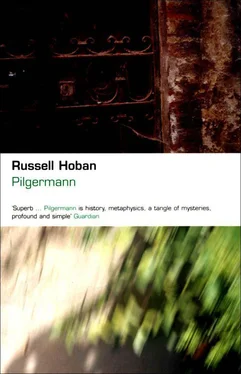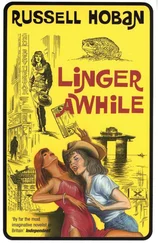Russell Hoban - Pilgermann
Здесь есть возможность читать онлайн «Russell Hoban - Pilgermann» весь текст электронной книги совершенно бесплатно (целиком полную версию без сокращений). В некоторых случаях можно слушать аудио, скачать через торрент в формате fb2 и присутствует краткое содержание. Год выпуска: 2002, Издательство: Bloomsbury Publishing PLC, Жанр: Современная проза, на английском языке. Описание произведения, (предисловие) а так же отзывы посетителей доступны на портале библиотеки ЛибКат.
- Название:Pilgermann
- Автор:
- Издательство:Bloomsbury Publishing PLC
- Жанр:
- Год:2002
- ISBN:нет данных
- Рейтинг книги:5 / 5. Голосов: 1
-
Избранное:Добавить в избранное
- Отзывы:
-
Ваша оценка:
- 100
- 1
- 2
- 3
- 4
- 5
Pilgermann: краткое содержание, описание и аннотация
Предлагаем к чтению аннотацию, описание, краткое содержание или предисловие (зависит от того, что написал сам автор книги «Pilgermann»). Если вы не нашли необходимую информацию о книге — напишите в комментариях, мы постараемся отыскать её.
Pilgermann — читать онлайн бесплатно полную книгу (весь текст) целиком
Ниже представлен текст книги, разбитый по страницам. Система сохранения места последней прочитанной страницы, позволяет с удобством читать онлайн бесплатно книгу «Pilgermann», без необходимости каждый раз заново искать на чём Вы остановились. Поставьте закладку, и сможете в любой момент перейти на страницу, на которой закончили чтение.
Интервал:
Закладка:
‘Can you really believe that?’ I said. ‘Can you really believe that Hidden Lion has called down this terrible thing upon itself?’ Think,’ said Bembel Rudzuk, ‘what we have done. We have made a provocation and an insult. We have used the names of God and the habitation of the Unseen and we have made a good-luck charm with our tiles. We have made an idolatry for ignorant people to whom prayer is only a kind of begging, we have put the rubbish of the seeable and the touchable between them and Allah, we have sped them on their way from any hope of the Garden, we have pointed them towards the Fire.’
‘Have we truly done so much evil?’ I said.
‘Only consider,’ said Bembel Rudzuk: ‘if the pattern of Hidden Lion is contiguous with infinity (and there can be no doubt of this, in our very souls we know it to be so) then everything about it is contiguous with infinity. If our action in making it was wrong (and we both know now that it was) then that wrong action is contiguous with infinity; its connexions extend to things and places we know not of, we cannot imagine the vastness of the web to which Hidden Lion is an entrance and a passageway.’
‘All things being contiguous,’ I said, ‘Hidden Lion can as well be an effect as a cause; it cannot be proved to be the beginning of a chain of evil.’
‘Sophistry cannot help us,’ said Bembel Rudzuk; ‘every action has its consequences and the consequences of the action of making Hidden Lion cannot be without evil.’
At that moment from the minaret there came the call of the mu’addhin. Bembel Rudzuk began his prayers and I drew a little apart from him and stood looking out over the city that I seemed to be approaching by sea in the grey dawn. Again I saw in my mind the terrified feet of the Syrian and Armenian Christians on the tawny, the red, and the black triangles and I wondered in what way any of what was happening could possibly have been willed by God in any of His or Its aspects. How far back would one have to go to find the cause from which this effect had arisen? All things being contiguous, one was driven back to the original bursting into being of the universe: immediately from that moment existed the possibility of everything that could possibly happen on this earth. From that moment two and two made four, and all else that could be until the end of time already was; on one or another, on a few or on many of the planes of virtuality and actuality that might at some time intersect, everything that could be already was. The choices that would have to be made by people who would not be born for thousands of millions of years were already forming with the galaxies and the nebulae, with the Virgin and the Lion. As far as I could see, the will of God was simply that everything possible would indeed be possible. Within that limitation the choice was ours, the reckoning His. And He was in us, one couldn’t get away from Him, that was the Fire of it, that was the Garden of it, at the centre of every soul and contiguous with infinity. The possibilities of choice were beyond all calculation and the probability of wrong choice so high as to be almost a certainty. Only God could think of such a game, and only humans would bother to play it.
Refreshed and desperate from my meditation I turned and saw another figure on the roof with us. My heart leapt in me; it was my young death. This was the very first time he had appeared to me since I had crossed the sea to come here. He was naked and he was standing by the parapet with his back to me but I recognized him at once. He was full-grown but there was that about the way he was standing that made me think of a child who cannot sleep or has had perhaps a bad dream and comes to be comforted. How my heart went out to him!
He turned to me, his face somehow obscure, not to be held in the eye. I looked to see if he had all his parts. He had, he was a complete man. He looked at me for a moment only, then he walked slowly to the stairs and was gone, his face still obscure in my mind, not to be recalled.
13
Soon must I tell of the fall of Antioch but not yet. Mortal life is a difficult proposition because hardly anything can be experienced as what it actually is; everything is time-distorted. In childhood we wait for things that seem too long in coming, we wait for treats, for presents, for festivals and holidays, we wait for growing up. There is so much waiting that suddenly childhood itself is gone with all that was being waited for. As grown-ups we find ourselves pitched headlong down a steep and slippery slide with everything hurtling towards us at great speed; some things smash us full in the face, others streak past half-glimpsed or unseen; everything has happened before we were ready for it. Only after the hurly-burly of mortal life is over can one have a really good look at what has happened; unburdened by choice and unthreatened by consequences one is able to sort through the half-glimpses of a lifetime and find perhaps one or two workable fragments of recognition.
So it is that only now in this little space of centuries since my death have I been able not so much to understand anything as simply to look carefully at everything to see if this fragment and that fragment which do not fit together may yet both belong to a shape which might be recognizable if seen entire.
I have in mind the deeds of the Franks and the Turks, such as I was able to see or hear about; I have in mind how men would sometimes rush forward, sometimes back, some on horseback, some on foot. I have in mind one particular night of the winter rains of 1097, it was soon after Christmas. At that time I was often on the walls of Antioch in the small hours of the night; I was in a state in which I could feel the passage of time as if I were an hourglass through which the sand was running more and more swiftly. It was well towards morning on this night that I am speaking of; it had been raining steadily but the rain had stopped, and now in the dim cloudlight I saw what seemed to be thousands of Frankish horsemen moving out of their encampment and heading up the valley of the Orontes.
Bembel Rudzuk came and stood with me. We were on that part of the wall by the Aleppo Gate that overlooked the sector of Bohemond of Taranto. On the hill behind his encampment the Franks had built a tower that we called Evil Eye; now we saw lanterns moving on the top of it while between us and it the dark horsemen slowly rode away into the fading darkness. Stubbornly stood the sodden and threadbare tents they left behind; in some of them glimmered the dim light of candles. We had no idea how many had gone but from other watchers we heard that more than half of the Franks remained to keep the siege. Many of them were starving and by now were regularly drinking the blood of their horses; we guessed that this moving-out of the thousands was a foraging expedition and the size of it indicated to us that they intended to move deep into hostile territory.
The next night there was again no rain nor was there a moon; the darkness of the sky was opaque. ‘This night will bring out Yaghi-Siyan,’ said Bembel Rudzuk. We went up on to the wall over the bridge gate and waited there for hours, equally expecting Turks to go out or Franks to come in. Even from what little we knew of the Franks there was nothing that they could have done that would have surprised us; starving as they were and faced with impregnable walls they might yet at any moment storm those walls. In moments of quiet like this it seemed to us that any sortie by the Turks could well provoke a counterattack that would bring the Franks raging into the city.
Bembel Rudzuk and I had no doubt whatever that a night would come when the Franks, whatever the odds against them, would take Antioch; it seemed to us that it was simply in the nature of things. And of course when that night came it would bring certain death to the Muslims and the Jews of Antioch.
Читать дальшеИнтервал:
Закладка:
Похожие книги на «Pilgermann»
Представляем Вашему вниманию похожие книги на «Pilgermann» списком для выбора. Мы отобрали схожую по названию и смыслу литературу в надежде предоставить читателям больше вариантов отыскать новые, интересные, ещё непрочитанные произведения.
Обсуждение, отзывы о книге «Pilgermann» и просто собственные мнения читателей. Оставьте ваши комментарии, напишите, что Вы думаете о произведении, его смысле или главных героях. Укажите что конкретно понравилось, а что нет, и почему Вы так считаете.












